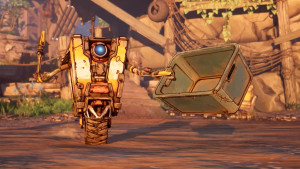What We Learned From Playing Assassin’s Creed Origins

As we just announced, Assassin’s Creed Origins is our latest cover story. Kimberley Wallace and I traveled to Montreal to check out the game and learn more about what the team was hoping to achieve with the latest entry. It’s a significant departure for the series, in that it brings RPG elements to the forefront scraps the longstanding way of handling combat. Kim and I decided to have a conversation about what we saw, since there’s so much to discuss – both for returning fans and players who are excited about playing an action/RPG set in ancient Egypt.
Jeff: There’s a lot to unpack here, Kim, so I’ll just get to it: What did you think of Assassin’s Creed Origins? I went into the cover-story trip with a little apprehension, to be honest. I know people have been asking for an ancient Egyptian setting for a while now, but it didn’t seem particularly interesting to me. After spending a couple of days at Ubisoft Montreal’s offices and getting an extensive look at the game, I’ve warmed up to it. I think the biggest thing I’m excited about though is how the team is fundamentally reexamining the series as a whole. Assassin’s Creed has been a favorite series of mine for a long time, but it was definitely due for a tune-up. Let’s take it from the top: Our fellow fans will undoubtedly get something out of this one, starting with the name “Origins.” We’re going back in more ways than one, right?
Kim: This is the earliest we’ve gone back, and it’s all to see how the brotherhood was established. With this, longtime fans should see how everything got its start, such as the feather ritual and the creed. What set it all into motion? We take control of Bayek, and while the team kept mum on exactly what puts him on his journey, he’s set to show us how everything came to be that we’ve been following in the series. That’s exciting in itself, but then you’re placed right into history during Cleopatra’s ascent to the throne. Ubisoft isn’t letting much slip on the story, but I’m excited to see its interpretation of Cleopatra. As someone who’s been following the series, I think there will be plenty of cool moments that give more background on all these iconic elements.

Jeff: Absolutely. It’s an interesting time period; even though it’s 1,000 years before the events of the first Assassin’s Creed game, this part of the world has been flourishing for millennia. In other words, don’t expect to see the construction of the pyramids – or at least don’t expect to see them within Bayek’s own lifetime. As the team says, the pyramids were as old to him as he is to us now.’ Time is a hell of a thing. You’ll be able to go inside the pyramids and other tombs, and collect treasure and other goodies for your trouble. I think it’s likely that if you’re observant you’ll also get some clues about what came earlier, too. This is just a guess, but I suspect players who care about the series’ First Civilization will get some answers in these ancient structures. I’d be surprised if they didn’t. Speaking of surprises, did anything immediately stand out to you with this new entry?
Kim: A lot of things surprised me about Origins, and I think the franchise was smart to take a year off. This is the Black Flag team, so I immediately noticed that influence. The spaces just feel bigger. You’re not controlling a pirate ship, but you still sail on a felucca. You can ride horses, and of course, camels. I was worried ancient Egypt might not have much variety, but I was wrong. Sure, you have temples and pyramids, but you also have more grasslands and swamps. Even cities that look more industrial like Alexandria, with a Greek/Roman influence. I was surprised about all the variety in the world. Even just the wildlife alone. We saw hippos, crocodiles, camels, and more in our demo. I think there are more opportunities for fun exploration and chaotic battles here than you’d think. As soon as we started our demo, I just wanted to explore and see what I’d find, whether it was underwater or tucked away in a tomb. How’d you feel about the setting and exploration?
Jeff: In the outset of our meeting, the team gave us a sense of the scale they’re talking about. Basically, it’s around the size of Black Flag’s entire Caribbean location, only on land. With that much land mass, they’re able to include not only the massive deserts that immediately spring to mind, but also the fertile lands of the Nile and its surrounding ecosystems. In other words, you can expect to see a lot of green in the game, which is a welcome relief. I know you covered some of this in your Five Things piece that just went up on the site, but one of the many big changes Origins brings is that it scraps the minimap. That means your eyes aren’t going to be focused on the corner of the screen. Instead of the minimap, there’s an Elder Scrolls-style compass bar at the top of the UI. It doesn’t sound like much, but I felt like much more engaged in the world because of that navigation tweak. It also helps feed into the game’s renewed focus on exploration and questing. It’s starting to sound an awful lot like an RPG, now that I think about it…

Kim: Yes! That’s probably one of the bigger changes. When we sat down with Ubisoft, the team emphasized how it wanted to move into the action/RPG territory, from being purely an action-adventure game. This means a larger focus on questing and leveling up than ever before. The game ditched its mission structure for quests, which is a smart move. It just felt like these more story-focused tasks fit better into the world. As you explore and talk to people, you might find something or someone interesting and you can see where it goes. For instance, remember that priest we saw flogging that young boy? I couldn’t help, but be like, ‘What the heck is going on here?!’ And then that quest ended up going to a place I didn’t expect and letting me decide how I wanted to act on it. Don’t expect choice or story à la Witcher, but there’s definitely some intriguing things going on in the world that you can choose to interact with and influence. The focus on leveling impacts everything – from the enemies you can fight to needing to focus on crafting better armor and weapons to stand a chance. Leveling up is also how you purchase better abilities and can really build your character how you want. Whether it’s staying true to your stealthy assassin abilities, being a terror on the battlefield, or even manipulating the world around you to ease your burden. Of course, this means battles are much different than before. How did you adjust to the RPG shift?
Jeff: I like the idea of being able to focus on the elements that you naturally gravitate toward. You don’t create a character from scratch – the main focus of the game is on Bayek, the guy who ends up forming the Brotherhood of Assassins – but you do have what seems like a great deal of flexibility in how you shape him. The demo had a pretty well-rounded skill tree, but you can emphasize certain aspects of the assassin skillset as you see fit. If you want to be a brute who soaks up hits and doesn’t need to slink around, fine. I tend to play as a traditional assassin, so I’ll probably level up skills that keep my blades sharp and my body hidden. But you don’t have to, if you’d rather just crack some skulls. I think more action-oriented players are going to like the game’s revamped combat system, which is another significant departure from previous games. You can’t succeed by holding down block and waiting for the “counterattack” prompt to appear on screen. You’re going to have to work for your victories now, in combat that requires much more skill than past games. The controls have been changed, too, to accommodate this shift. Attacks are now on the right trigger and shoulder button, and X now lets you dodge attacks. It took a little while to adjust, but it was a refreshing change. What did you think?

Kim: I kept pressing the dodge button to attack, but finally warmed up to the new controls after we played for a bit. I like that battles take more skill. I’m so used to being able to just go in and strike an enemy down immediately, but you definitely have to use all the tools at your disposal here. We spent some time in the gladiator arena (a side activity in the game), and these were such tense battles. The first one pit us against an array of enemies attacking all at once, which the A.I. no longer waits one by one to attack you, so you have to always watch your back. Then we took on this really huge barbarian, and it was an intense boss battle that required us to study his patterns to win. I never thought I’d do that in an Assassin’s Creed game. Even outside the arena, I felt like I was using everything in my power to survive – putting up my shield, dodging, parrying.
Origins requires more strategy than past games. That’s why I like that you have the ability to control your eagle, Senu. You can change to her perspective for a bird’s eye view and use her to mark enemies, treasure, and find hidden passageways. I liked being able to strategize by sending her to scout enemy hideouts so there were no surprises and I could find the best route. I found myself thinking more than I usually do in AC games and combat kept me on my toes. I’m just not sure if everyone is going to love having to level up every little thing to survive. Yes, this includes your hidden blades. You can’t just be at level 10 and instant kill a level 40 guy. Sometimes those hidden blade assassinations were just so damn satisfying, though! What’d you think of the more challenging combat?
Jeff: I’m definitely into it. I finally finished Syndicate a week or so before our trip, and while I enjoyed a lot about that game, combat got dull once I locked into a routine that worked. I think the loot system will provide more of an incentive to experiment than the traditional crafted or purchased item flow of ACs past. Senu reminds me of a couple of other recent Ubisoft games, though the Origins team was quick to fend off comparisons. They took what seemed like a strange amount of pride in coming up with the eagle on their own – so don’t you dare think that Far Cry Primal had anything at all to do with that idea. Functionally, Senu feels like how I use the drone in Ghost Recon Wildlands, scoping out a populated area before an attack. Unlike that one, however, Bayek can’t call in his fellow assassins to take care of business for him. Aside from missions that include companions, he can’t call in support or work with a squad that’s on-call and waiting for his go. He hasn’t formed the brotherhood quite yet, after all.
We’ll have lots more information on Assassin’s Creed Origins throughout the month, so be sure to check back in with our coverage hub.










